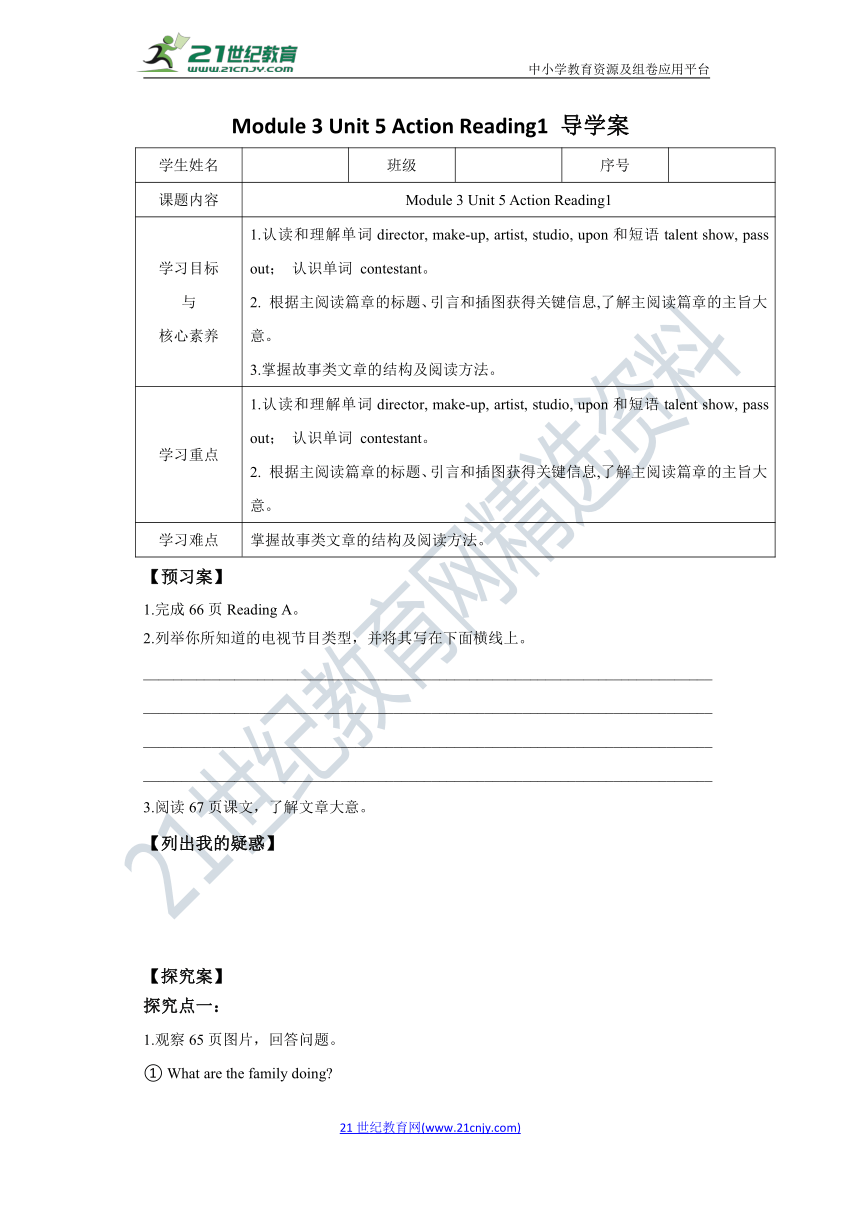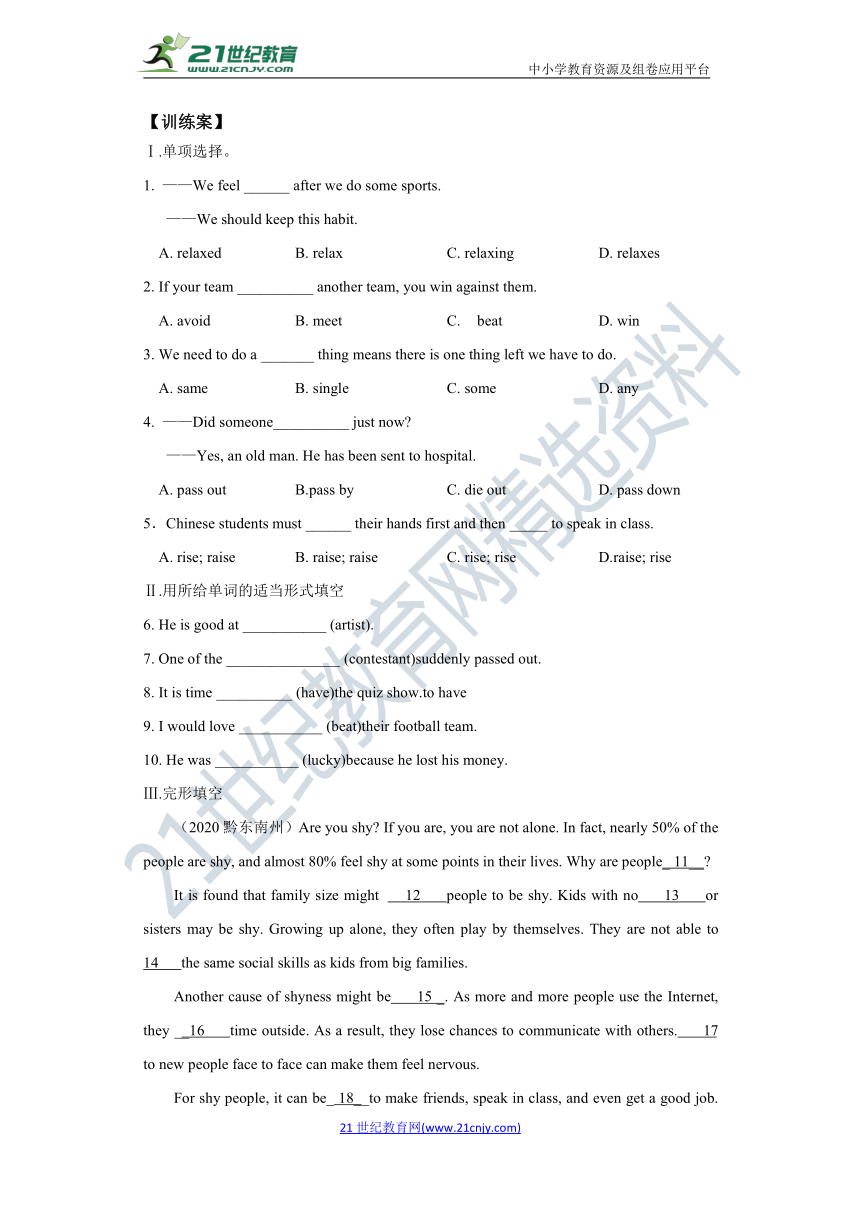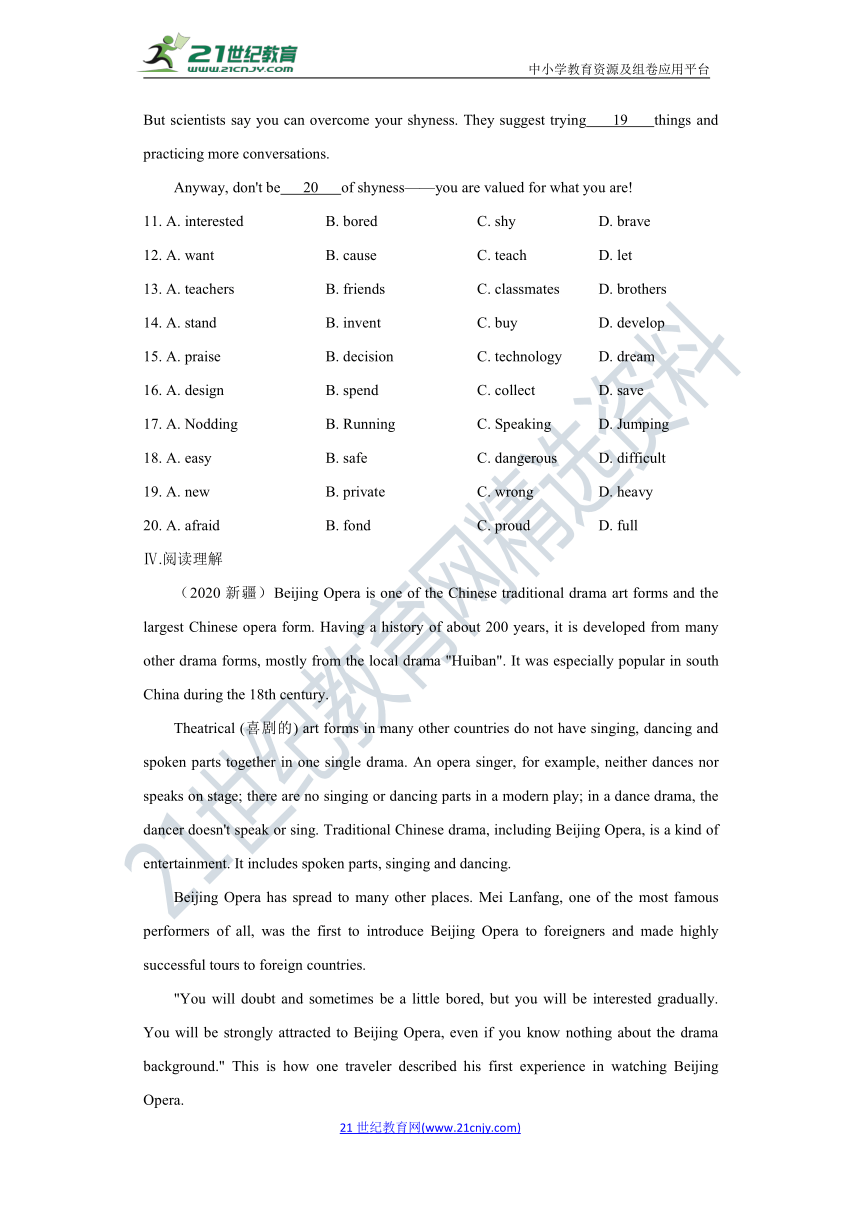Unit5 Action! 第1课时ReadingI导学案
文档属性
| 名称 | Unit5 Action! 第1课时ReadingI导学案 |

|
|
| 格式 | doc | ||
| 文件大小 | 2.5MB | ||
| 资源类型 | 试卷 | ||
| 版本资源 | 牛津深圳版 | ||
| 科目 | 英语 | ||
| 更新时间 | 2020-07-31 00:00:00 | ||
图片预览





文档简介
中小学教育资源及组卷应用平台
Module 3 Unit 5 Action Reading1 导学案
学生姓名
班级
序号
课题内容 Module 3 Unit 5 Action Reading1
学习目标 与
核心素养 1.认读和理解单词director, make-up, artist, studio, upon和短语talent show, pass out; 认识单词 contestant。
2. 根据主阅读篇章的标题、引言和插图获得关键信息,了解主阅读篇章的主旨大意。
3.掌握故事类文章的结构及阅读方法。
学习重点 1.认读和理解单词director, make-up, artist, studio, upon和短语talent show, pass out; 认识单词 contestant。
2. 根据主阅读篇章的标题、引言和插图获得关键信息,了解主阅读篇章的主旨大意。
学习难点 掌握故事类文章的结构及阅读方法。
【预习案】
1.完成66页Reading A。
2.列举你所知道的电视节目类型,并将其写在下面横线上。
___________________________________________________________________________
___________________________________________________________________________
___________________________________________________________________________
___________________________________________________________________________
3.阅读67页课文,了解文章大意。
【列出我的疑惑】
【探究案】
探究点一:
1.观察65页图片,回答问题。
① What are the family doing?
② Why are they doing that?
③What does this cartoon imply?
2. 完成66页B Before you read.
探究点二:
1.默读课文,将下列句子排序。
A. Angela did really well, and was soon ahead of the other two contestants.
B. The director asked for another new contestant.
C. Denise and her friend Angela went to a TV studio to watch a live TV quiz show.
D. The host of the quiz show, Lester Li, ran out onto the stage and started the show.
E. Angela wanted to be on TV and raised her hand.
F. Angela answered the last question correctly and won the prize.
G. Suddenly, one of the contestants passed out and fell across her desk.
H. A make-up artist quickly put make-up on Angela’s face and brushed her hair.
( )à( ) à( ) à( ) à( ) à( ) à( ) à( )
2.默读文章,完成表格。
Lines 1~7 opening background
Information Who:__________________________
When:_________________________
Where:________________________
What:They ____________________.
Lines 8~14
_______________ problem
Why: One of the contestants ___________.
Lines15~24 _______________ An unexpected turn Angela _________ the contestant.
Lines25~44 _______________ how to solve
the problem Angela answered all the questions_________
and was soon ________ the other two contestants.
Lines45~51 ________ end Angela ________________________!
3.默读全文,填空。
Angela and Denise were watching a quiz show at the s________. Suddenly one of the c_________ passed out. The d________ asked the audience who wanted to be on TV, Angela raised her hand. Then she was led o________ the stage and a m________ a________ rushed f________ to help her get prepared. Angela was r________ and had no trouble answering the questions. She was a________ of the others. When Angela just needed to answer six more questions to b________ the other contestants, Denise was too excited to keep s________. Soon there was only a s________ question left before Angela got the final v________. Did she succeed? Yes! Finally she was the l______ winner!
4.完成课本68页C1,C2。
探究点三:Language points
1. surprise①_____________②_____________
2. 在……中,用于数量是“三者(或以上)”的范围_____________________
“在……之间”,用于“两者”之间的范围_____________________
3. 盼望,期待_______________
4. second ①__________________②______________________
5. 到……的时间了_________________
该(某人)做某事的时间了_________________
6. ahead of①_________________ ②_________________③_________________
7. 再多六个,再/又六个_________________
辨析beat 与win:
beat的宾语是_____________________________________________________________
win的宾语是_____________________________________________________________
8. 如此…… 以致……_________________ 当that 后面接肯定句时可转换为
_________________当that 后接否定句时可转换为_________________
9.although引导_________________从句,相当于_______,不能和________一起连用。
看起来怎么样;似乎;好像如何seem+_________________
【我的知识网络图】
【训练案】
Ⅰ.单项选择。
1. ——We feel ______ after we do some sports.
——We should keep this habit.
A. relaxed B. relax C. relaxing D. relaxes
2. If your team __________ another team, you win against them.
A. avoid B. meet C. beat D. win
3. We need to do a _______ thing means there is one thing left we have to do.
A. same B. single C. some D. any
4. ——Did someone__________ just now?
——Yes, an old man. He has been sent to hospital.
A. pass out B.pass by C. die out D. pass down
5.Chinese students must ______ their hands first and then _____ to speak in class.
A. rise; raise B. raise; raise C. rise; rise D.raise; rise
Ⅱ.用所给单词的适当形式填空
6. He is good at ___________ (artist).
7. One of the _______________ (contestant)suddenly passed out.
8. It is time __________ (have)the quiz show.to have
9. I would love ___________ (beat)their football team.
10. He was ___________ (lucky)because he lost his money.
Ⅲ.完形填空
(2020黔东南州)Are you shy? If you are, you are not alone. In fact, nearly 50% of the people are shy, and almost 80% feel shy at some points in their lives. Why are people_ 11__?
It is found that family size might 12 people to be shy. Kids with no 13 or sisters may be shy. Growing up alone, they often play by themselves. They are not able to 14 the same social skills as kids from big families.
Another cause of shyness might be 15 _. As more and more people use the Internet, they __16 time outside. As a result, they lose chances to communicate with others. 17 to new people face to face can make them feel nervous.
For shy people, it can be_ 18__to make friends, speak in class, and even get a good job. But scientists say you can overcome your shyness. They suggest trying 19 things and practicing more conversations.
Anyway, don't be 20 of shyness——you are valued for what you are!
11. A. interested B. bored C. shy D. brave
12. A. want B. cause C. teach D. let
13. A. teachers B. friends C. classmates D. brothers
14. A. stand B. invent C. buy D. develop
15. A. praise B. decision C. technology D. dream
16. A. design B. spend C. collect D. save
17. A. Nodding B. Running C. Speaking D. Jumping
18. A. easy B. safe C. dangerous D. difficult
19. A. new B. private C. wrong D. heavy
20. A. afraid B. fond C. proud D. full
Ⅳ.阅读理解
(2020新疆)Beijing Opera is one of the Chinese traditional drama art forms and the largest Chinese opera form. Having a history of about 200 years, it is developed from many other drama forms, mostly from the local drama "Huiban". It was especially popular in south China during the 18th century.
Theatrical (喜剧的) art forms in many other countries do not have singing, dancing and spoken parts together in one single drama. An opera singer, for example, neither dances nor speaks on stage; there are no singing or dancing parts in a modern play; in a dance drama, the dancer doesn't speak or sing. Traditional Chinese drama, including Beijing Opera, is a kind of entertainment. It includes spoken parts, singing and dancing.
Beijing Opera has spread to many other places. Mei Lanfang, one of the most famous performers of all, was the first to introduce Beijing Opera to foreigners and made highly successful tours to foreign countries.
"You will doubt and sometimes be a little bored, but you will be interested gradually. You will be strongly attracted to Beijing Opera, even if you know nothing about the drama background." This is how one traveler described his first experience in watching Beijing Opera.
Beijing Opera is China's national opera and it is full of Chinese cultural traditions. Welcome to China and enjoy Beijing Opera!
21. Beijing Opera is_______.
A. unpopular in north China
B. only developed from the local drama "Huiban"
C. a much larger Chinese opera form
D. a Chinese traditional drama art form
22. After watching Beijing Opera for the first time, the traveler felt_______.
A. busy B. nervous C. interested D. uneasy
23. The underlined word "_______it" in the last paragraph means
A. Beijing Opera B. local dramas
C. an opera singer D. a modern play
24. According to the passage, which of the following statements is NOT true?
A. Beijing Opera is a kind of entertainment.
B. An opera singer neither dances nor speaks on stage usually.
C. Only old people are interested in Beijing Opera.
D. Mei Lanfang was the first one to introduce Beijing Opera to foreigners.
25. The main purpose of writing the passage is to
A. ask young people to learn Beijing Opera
B. tell us something about Beijing Opera
C. show why Beijing Opera is popular in Europe
D. introduce everything about foreign Opera
【教与学的反思】
预习案答案:
1.
2.beauty contest,puppet show,cartoon,singing contest,cookery programme,concert,sitcom,
detective/police drama,romantic drama,soap opera,historical drama,sports,documentary
,educational programme,variety show,quiz show,weather forecast,news
探究案答案:
探究点一:
1.
2. a; Travel Quiz; b
探究点二:
1.
2.
3.
探究点三:
①惊奇;惊异②惊奇;惊讶;意外 的事;吃惊的事
2. among ;between
3. look forward to
4. ①秒②第二
5. It is time for sth;It is time (for sb) to do sth
6. ①(地点上) 在...之前②(时间上) 在...之前③(工作、学习上)在...之前
7. six more
beat的宾语是比赛、竞争的对手,指人或球队的名词或代词.
win的宾语是比赛、战争、奖品、金钱等名词,即race, match, game,competition, war, prize之类的词。
8. so ... that ... ;adj. / adv.+enough+to do sth;too ... to do sth
9. 让步状语从句;though;but
seem+adj.
训练案答案:
Ⅰ.1-5 ACBAD
Ⅱ. 6. art 7. contestants 8. to have 9. to beat 10. unlucky
Ⅲ.11-15 CBDDC 16-20 BCDAA
Ⅳ.21-25 DCACB
_21?????????è?????(www.21cnjy.com)_
Module 3 Unit 5 Action Reading1 导学案
学生姓名
班级
序号
课题内容 Module 3 Unit 5 Action Reading1
学习目标 与
核心素养 1.认读和理解单词director, make-up, artist, studio, upon和短语talent show, pass out; 认识单词 contestant。
2. 根据主阅读篇章的标题、引言和插图获得关键信息,了解主阅读篇章的主旨大意。
3.掌握故事类文章的结构及阅读方法。
学习重点 1.认读和理解单词director, make-up, artist, studio, upon和短语talent show, pass out; 认识单词 contestant。
2. 根据主阅读篇章的标题、引言和插图获得关键信息,了解主阅读篇章的主旨大意。
学习难点 掌握故事类文章的结构及阅读方法。
【预习案】
1.完成66页Reading A。
2.列举你所知道的电视节目类型,并将其写在下面横线上。
___________________________________________________________________________
___________________________________________________________________________
___________________________________________________________________________
___________________________________________________________________________
3.阅读67页课文,了解文章大意。
【列出我的疑惑】
【探究案】
探究点一:
1.观察65页图片,回答问题。
① What are the family doing?
② Why are they doing that?
③What does this cartoon imply?
2. 完成66页B Before you read.
探究点二:
1.默读课文,将下列句子排序。
A. Angela did really well, and was soon ahead of the other two contestants.
B. The director asked for another new contestant.
C. Denise and her friend Angela went to a TV studio to watch a live TV quiz show.
D. The host of the quiz show, Lester Li, ran out onto the stage and started the show.
E. Angela wanted to be on TV and raised her hand.
F. Angela answered the last question correctly and won the prize.
G. Suddenly, one of the contestants passed out and fell across her desk.
H. A make-up artist quickly put make-up on Angela’s face and brushed her hair.
( )à( ) à( ) à( ) à( ) à( ) à( ) à( )
2.默读文章,完成表格。
Lines 1~7 opening background
Information Who:__________________________
When:_________________________
Where:________________________
What:They ____________________.
Lines 8~14
_______________ problem
Why: One of the contestants ___________.
Lines15~24 _______________ An unexpected turn Angela _________ the contestant.
Lines25~44 _______________ how to solve
the problem Angela answered all the questions_________
and was soon ________ the other two contestants.
Lines45~51 ________ end Angela ________________________!
3.默读全文,填空。
Angela and Denise were watching a quiz show at the s________. Suddenly one of the c_________ passed out. The d________ asked the audience who wanted to be on TV, Angela raised her hand. Then she was led o________ the stage and a m________ a________ rushed f________ to help her get prepared. Angela was r________ and had no trouble answering the questions. She was a________ of the others. When Angela just needed to answer six more questions to b________ the other contestants, Denise was too excited to keep s________. Soon there was only a s________ question left before Angela got the final v________. Did she succeed? Yes! Finally she was the l______ winner!
4.完成课本68页C1,C2。
探究点三:Language points
1. surprise①_____________②_____________
2. 在……中,用于数量是“三者(或以上)”的范围_____________________
“在……之间”,用于“两者”之间的范围_____________________
3. 盼望,期待_______________
4. second ①__________________②______________________
5. 到……的时间了_________________
该(某人)做某事的时间了_________________
6. ahead of①_________________ ②_________________③_________________
7. 再多六个,再/又六个_________________
辨析beat 与win:
beat的宾语是_____________________________________________________________
win的宾语是_____________________________________________________________
8. 如此…… 以致……_________________ 当that 后面接肯定句时可转换为
_________________当that 后接否定句时可转换为_________________
9.although引导_________________从句,相当于_______,不能和________一起连用。
看起来怎么样;似乎;好像如何seem+_________________
【我的知识网络图】
【训练案】
Ⅰ.单项选择。
1. ——We feel ______ after we do some sports.
——We should keep this habit.
A. relaxed B. relax C. relaxing D. relaxes
2. If your team __________ another team, you win against them.
A. avoid B. meet C. beat D. win
3. We need to do a _______ thing means there is one thing left we have to do.
A. same B. single C. some D. any
4. ——Did someone__________ just now?
——Yes, an old man. He has been sent to hospital.
A. pass out B.pass by C. die out D. pass down
5.Chinese students must ______ their hands first and then _____ to speak in class.
A. rise; raise B. raise; raise C. rise; rise D.raise; rise
Ⅱ.用所给单词的适当形式填空
6. He is good at ___________ (artist).
7. One of the _______________ (contestant)suddenly passed out.
8. It is time __________ (have)the quiz show.to have
9. I would love ___________ (beat)their football team.
10. He was ___________ (lucky)because he lost his money.
Ⅲ.完形填空
(2020黔东南州)Are you shy? If you are, you are not alone. In fact, nearly 50% of the people are shy, and almost 80% feel shy at some points in their lives. Why are people_ 11__?
It is found that family size might 12 people to be shy. Kids with no 13 or sisters may be shy. Growing up alone, they often play by themselves. They are not able to 14 the same social skills as kids from big families.
Another cause of shyness might be 15 _. As more and more people use the Internet, they __16 time outside. As a result, they lose chances to communicate with others. 17 to new people face to face can make them feel nervous.
For shy people, it can be_ 18__to make friends, speak in class, and even get a good job. But scientists say you can overcome your shyness. They suggest trying 19 things and practicing more conversations.
Anyway, don't be 20 of shyness——you are valued for what you are!
11. A. interested B. bored C. shy D. brave
12. A. want B. cause C. teach D. let
13. A. teachers B. friends C. classmates D. brothers
14. A. stand B. invent C. buy D. develop
15. A. praise B. decision C. technology D. dream
16. A. design B. spend C. collect D. save
17. A. Nodding B. Running C. Speaking D. Jumping
18. A. easy B. safe C. dangerous D. difficult
19. A. new B. private C. wrong D. heavy
20. A. afraid B. fond C. proud D. full
Ⅳ.阅读理解
(2020新疆)Beijing Opera is one of the Chinese traditional drama art forms and the largest Chinese opera form. Having a history of about 200 years, it is developed from many other drama forms, mostly from the local drama "Huiban". It was especially popular in south China during the 18th century.
Theatrical (喜剧的) art forms in many other countries do not have singing, dancing and spoken parts together in one single drama. An opera singer, for example, neither dances nor speaks on stage; there are no singing or dancing parts in a modern play; in a dance drama, the dancer doesn't speak or sing. Traditional Chinese drama, including Beijing Opera, is a kind of entertainment. It includes spoken parts, singing and dancing.
Beijing Opera has spread to many other places. Mei Lanfang, one of the most famous performers of all, was the first to introduce Beijing Opera to foreigners and made highly successful tours to foreign countries.
"You will doubt and sometimes be a little bored, but you will be interested gradually. You will be strongly attracted to Beijing Opera, even if you know nothing about the drama background." This is how one traveler described his first experience in watching Beijing Opera.
Beijing Opera is China's national opera and it is full of Chinese cultural traditions. Welcome to China and enjoy Beijing Opera!
21. Beijing Opera is_______.
A. unpopular in north China
B. only developed from the local drama "Huiban"
C. a much larger Chinese opera form
D. a Chinese traditional drama art form
22. After watching Beijing Opera for the first time, the traveler felt_______.
A. busy B. nervous C. interested D. uneasy
23. The underlined word "_______it" in the last paragraph means
A. Beijing Opera B. local dramas
C. an opera singer D. a modern play
24. According to the passage, which of the following statements is NOT true?
A. Beijing Opera is a kind of entertainment.
B. An opera singer neither dances nor speaks on stage usually.
C. Only old people are interested in Beijing Opera.
D. Mei Lanfang was the first one to introduce Beijing Opera to foreigners.
25. The main purpose of writing the passage is to
A. ask young people to learn Beijing Opera
B. tell us something about Beijing Opera
C. show why Beijing Opera is popular in Europe
D. introduce everything about foreign Opera
【教与学的反思】
预习案答案:
1.
2.beauty contest,puppet show,cartoon,singing contest,cookery programme,concert,sitcom,
detective/police drama,romantic drama,soap opera,historical drama,sports,documentary
,educational programme,variety show,quiz show,weather forecast,news
探究案答案:
探究点一:
1.
2. a; Travel Quiz; b
探究点二:
1.
2.
3.
探究点三:
①惊奇;惊异②惊奇;惊讶;意外 的事;吃惊的事
2. among ;between
3. look forward to
4. ①秒②第二
5. It is time for sth;It is time (for sb) to do sth
6. ①(地点上) 在...之前②(时间上) 在...之前③(工作、学习上)在...之前
7. six more
beat的宾语是比赛、竞争的对手,指人或球队的名词或代词.
win的宾语是比赛、战争、奖品、金钱等名词,即race, match, game,competition, war, prize之类的词。
8. so ... that ... ;adj. / adv.+enough+to do sth;too ... to do sth
9. 让步状语从句;though;but
seem+adj.
训练案答案:
Ⅰ.1-5 ACBAD
Ⅱ. 6. art 7. contestants 8. to have 9. to beat 10. unlucky
Ⅲ.11-15 CBDDC 16-20 BCDAA
Ⅳ.21-25 DCACB
_21?????????è?????(www.21cnjy.com)_
